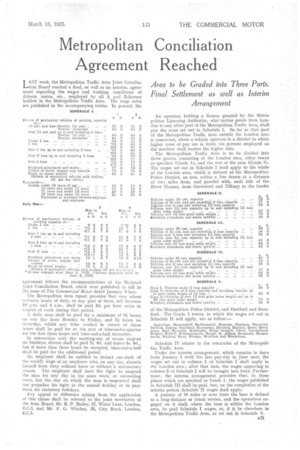Metropolitan Conciliation Agreement Reached
Page 45

If you've noticed an error in this article please click here to report it so we can fix it.
LAST week, the Metropolitan Traffic Area Joint Conciliation Board reached a final, as well as an interim, agreement regarding the wages and Working conditions of drivers, mates, etc., employed by all A and B-licence holders in the Metropolitan Traffic Area. The wage rates are published in the accompanying tables. In general, the a greement follows the recommendations of the National joint Conciliation Board, which. were published in full in the issue of The Commercial Motor dated January 4 last.
The Metropolitan Area report provides that men whose ordinary hours of duty, or any part of them, fall between 10 p.m. and 4 a.m., shall be paid 2d. per hour extra in respect of work during that period.
A daily man shall be paid for a minimum of 81 hours on any day from Monday to Friday, and ri?:, hours on Saturday, whilst any time worked in excess of those hours shall be paid for at the rate of time-and-a-quarter for the first three hours and time-and-a-half thereafter.
In connection with the washing-oat of steam wagons on Sundays, drivers shall be paid 7s. 6d. and mates 5s. 6d., but if more than three hours be occupied, time-and-a-half shall be paid for the additional period.
An employer shall be entitled to deduct one-sixth of the weekly wage of an employee who, on any day, absents himself from duty without leave or without a satisfactory reason. The employer shall have the right to suspend the man for any day in the same week, or succeeding week, but the day on which the man is suspended shall not prejudice his right to the annual holiday or to payment for statutory holidays.
Any appeal or difference arising from the application of this clause shall be referred to the joint secretaries of the Area Board, Mr. R. P. Bailey, 17, Water Lane, London, E.C.3, and Mr. F. G. Witcher, 28, City Road, London,
An operator, holding a licence granted by the Metro politan Licensing Authority, who carries goods from Lon don to any other part of the Metropolitan Traffic Area, shall pay the rates set out in Schedule I. So far as that part of the Metropolitan Traffic Area outside the London area is concerned, where a vehicle operates in a district in which higher rates of pay are in force, the persons employed on the machine shall receive the higher rate.
The Metropolitan Traffic Area is to he divided into three grades, consisting. of the London area, other towns as specified (Grade 1), and the rest of the area (Grade 3). The wages set out in Schedule I shall apply to the whole of the London area, which is defined as the Metropolitan Police District, an area within a line drawn at a distance of two miles from, and parallel with, each side of the River Thames, from Gravesend and Tilbury to the border
of the Metropolitan Police District, and Dartford and Rom ford. The Grade 1 towns, in which the wages set out in Schedule II will apply, are as follow:—
Amershani, Beacons'Rehl, Berkhamsted, Roxmoor, Chesham, Dunstable Dorking, Epping, Guildford, Harpenden, Hertford, Hatfield, Memel Hemp stead, tiigh Wycombe, Hoddescion, Kings Langley, Luton, Meatherhead Reigate, Redhill, Rickmansworth, Slough, St. Albans, Streneake, Thames haven, Watford, Ware, Welwyn, Wrotharn and Westoreani.
Schedule IV relates to the remainder of the Metropolitan Traffic Area.
Under the interim arrangement, which remains in force from January 1 until the last pay-day in June next, the wages set out in column 1 of Schedule I shall apply in the London area ; after that date, the wages appearing in column 2 of Schedule I will be brought into force. Furthermore, the interim arrangement provides that, in those places which are specified as Grade I, the wages published in Schedule III shall be paid, but, on the completion of the interim period, Schedule II wages shall apply.
A journey of 70 miles or over from the base is defined as a long-distance or trunk service, and the operatives engaged on it shall, where the base is within the London area, be paid Schedule I wages, or, if it be elsewhere in the Metropolitan Traffic Area, as set out in Schedule V.




























































































